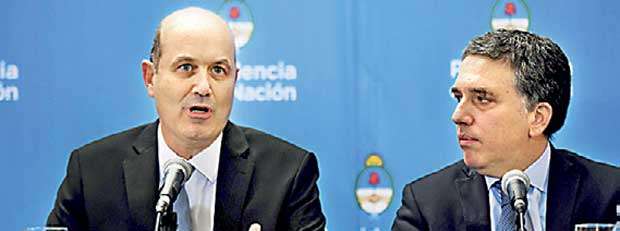09 Jun 2018 - {{hitsCtrl.values.hits}}

Argentina’s Central Bank Governor Federico Sturzenegger (L) speaks next to Argentina’s Finance Minister Nicolas Dujovne during a press conference in Buenos Aires
BUENOS AIRES (AFP): The International Monetary Fund (IMF) agreed with Argentina to a standby loan of US$50 billion over a three-year period, Finance Minister Nicolas Dujovne said this week.
“We have looked to the IMF to avoid a crisis,” the minister told a news conference in Buenos Aires, adding there would be an “immediate” payment of US$15 billion.
“We are engaged in the construction of a normal country. It support for our program,” he added.
At the end of March, Argentina suffered a crisis of confidence that caused it to lose more than US$10 billion of Central Bank reserves and saw the peso plunge by nearly 20 percent. That led Latin America’s third-largest economy to ask for IMF assistance to help the country face mounting inflation, budget deficits and a weakening currency.
“We are going to reinforce the autonomy of the central bank,” said its chairman, Federico Sturzenegger, who lead the conference alongside Dujovne.
Dujovne added that Argentina has set a target of 17 percent inflation for 2019, 13 percent for 2020 and 9 percent for 2021. Argentina’s annual inflation target was 15 percent for 2018, but had reached almost 10 percent by April.
“We are going to have increased inflation,” Dujovne acknowledged. The government has so far not managed to limit persistently high inflation, which has exceeded 20 percent for more than a decade, a key aim of President Mauricio Macri’s center-right government.
A path to reduce the budget deficit and balance the budget by 2020 was also agreed with the IMF.
The agreement revises the budget deficit target, before debt payment, to 2.7 percent of GDP in 2018, compared to 3.2 percent previously forecast.
Opinion polls said as many as 75 percent of Argentinians opposed any agreement with the IMF, which many link to painful memories of past economic and social crisis that culminated in 2001 with a sovereign debt default, for which many Argentinians blame the IMF.
Thousands demonstrated in Buenos Aires in late May against an IMF bailout, marching to government offices and brandishing anti-IMF banners.
18 Nov 2024 37 minute ago
18 Nov 2024 1 hours ago
18 Nov 2024 1 hours ago
18 Nov 2024 2 hours ago
18 Nov 2024 2 hours ago